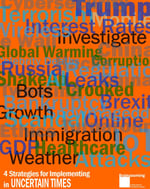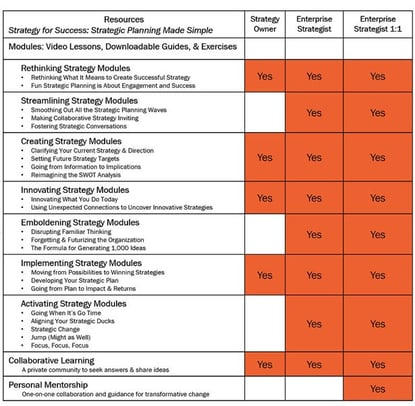We mentioned how frequently we're being asked to incorporate uncertainty into Brainzooming creativity and strategic thinking presentations. We have considerable content on moving forward amid uncertainty (including the 4 Strategies for Implementing in Uncertain Times eBook), and we’re developing additional strategic thinking pieces on uncertainty and flexibility.
Considering that, I added new strategic thinking content on flexibility into my presentation at The Leadership Institute. It suggested ways to reduce your organizational dependency on aspects of your operation that may seem important, but are ripe for less (or even no) strategic attention. Walking away from what seems essential is frightening – and has been for a long time. That’s why I reached for a long-ago quote to inspire the content: "For when I am weak, then I am strong," from the twelfth chapter of St. Paul's second letter to the Corinthians.
The quote flies in the face of so many (nearly all?) media messages that say strength ONLY comes from having everything.
Yet, even in temporal situations, detachment from seemingly critical things can create the flexibility to look at compelling new options. Detachment provides freedom to chart your own preferred course of action, unencumbered by obligations to people or forces that don't care about your best interests.
5 Ideas for Reducing Dependency on What Seems Critical

Here are five strategic thinking possibilities for reducing dependency on what seems to be critical right now:
- Find alternative approaches to what you are doing now
- Care less about a critical thing by setting your organizational desire to the side and changing your perspective
- Replace what seems important now with something else that is more abundant or more under your control
- Redirect your legacy needs so they aren't as important anymore
- Give up what has been important cold turkey with a sudden and immediate stop
None of this is to suggest reducing dependency on critical things will be easy or without pain.
One example I shared was from a Catholic priest. He talked about how his parish school was starting to raise tuition $500 annually until tuition alone covers its operating costs. The objective is eliminating the federal money the school now receives. Taking money from the government can lock the school into teaching or doing things against its faith. He acknowledged the strategy change will cause hardship; the school is trying to work with parents impacted most by the new strategy. Ultimately, eliminating the dependency on outside funds will put the school in greater control of setting a strategy consistent with its faith.
What is your organization depending on currently where reducing your dependency will make you stronger? Start tackling an alternative strategy before outside forces require you to do it. – Mike Brown
 The Brainzooming eBook 4 Strategies for Implementing in Uncertain Times will help you examine your strategy foundation, insights, profitability drivers, and decision making processes when uncertainty is high. We share suggestions on:
The Brainzooming eBook 4 Strategies for Implementing in Uncertain Times will help you examine your strategy foundation, insights, profitability drivers, and decision making processes when uncertainty is high. We share suggestions on:
- Using your organization’s core purpose to shape decisions when things are changing
- Reaching out to employees with valuable insights into what to watch out for and what to expect
- Sharpening your command of cost and profit levers in your organization
- Implementing processes to focus and sharpen decision making




